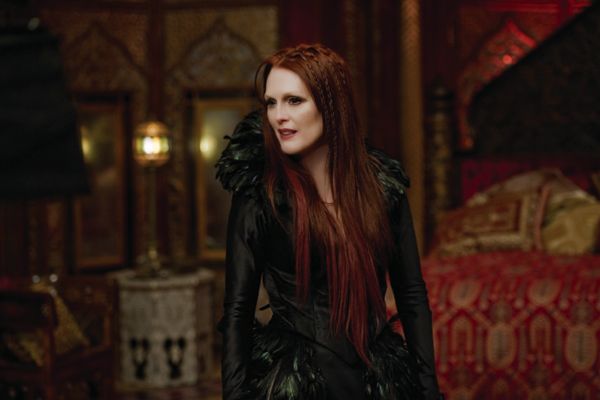'Seventh Son’s' Jeff Bridges & Julianne Moore Talk About Their Own Big Lebowski Reunion and Preparing For Moore’s Oscar Night
- Details
- Category: Interviews
- Created: Saturday, 07 February 2015 21:40
- Published: Sunday, 08 February 2015 11:34
- Written by Lupe R Haas
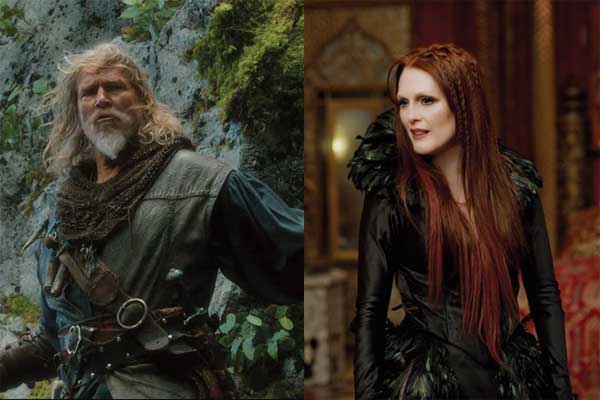
Seventeen years after working together on The Big Lebowski, Julianne Moore and Jeff Bridges reunite in the fantasy adventure tale, SEVENTH SON along with Ben Barnes (The Chronicles of Narnia). The Academy Award winner (Bridges), four-time Oscar nominee (Moore) and Barnes talk about the movie, working together once again and for Ben, looking at both actors as mentors on the set.
In the SEVENTH SON, Jeff Bridges is the last warrior of a mystical order, but a prophecy warns of a seventh son whose incredible powers can restore order. This supposed hero (Barnes) is torn from his quiet life as a farmhand and embarks on a daring adventure with his battle-hardened mentor to vanquish a dark queen (Moore) and the army of supernatural assassins she has dispatched against their kingdom.
Q: This film talks a lot about destiny and fate. How much has fate played a role in your lives?
JEFF BRIDGES: Destiny and fate? You guys wanna go first on that one?
BEN BARNES: Nobody wants to go first on that!
JULIANNE MOORE: I don’t know. I mean, that’s a tough one. I don’t know that I believe in destiny and fate. I do believe in desire and luck. I always say to my children, it sounds really silly, but I remember when I was 10-years-old I said, ‘I’m gonna have two children. I’m gonna have a boy and a girl,’ [laughs] and lined up my dolls and stuff like that, and I had this idea that I was gonna have a little boy and I was gonna have a little girl, and I always say to them, ‘Look, you know, I got what I wished for.’ So, I mean, I had desire for something that I knew that I wanted, but I do feel like it was lucky that it happened. But in a way, I could reframe it now and say it was destiny, so I think sometimes a lot of what we want, you can say it’s that in retrospect.
BRIDGES: What comes to mind as you say that, I’m sort of curious what you meant by the movie having to do with those things.
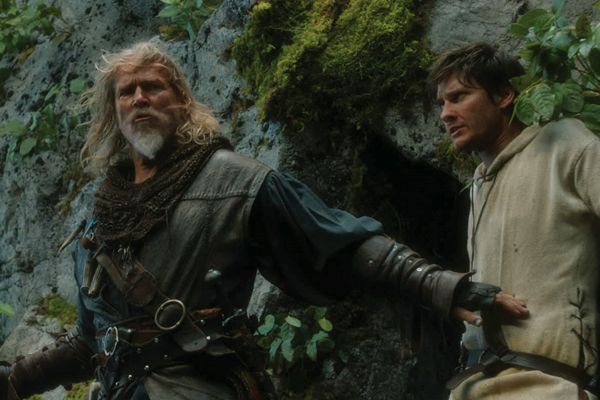
Q: Ben, you have a line when she asks you, ‘Did you choose,’ and you say, ‘No, it chose me.’
BARNES: Yeah, ‘It chose me.’ I think it’s discomforting to think about the idea of living life with everything fated and not having a freedom of choice, freedom of will. That’s kind of an unsettling thought to me, but it’s also unsettling to think of a life where the way that you behave and the way that you treat other people doesn’t come back around and earn you something in return, which you could certainly put in the category of something other than just chaos. I think there’s an interesting balance and it’s certainly a question which affects every element of your life. I think it’s an interesting theme to be exploring in terms of subtext in any film, whether it’s set in the Dark Ages or the future in space or in a cave.
BRIDGES: I’m gonna stumble into an answer. As The Dude might say, ‘This is just my opinion, man,’ you know? You got the universe, right? You got all those black holes and the whole deal, all that stuff we don’t know about and yet here we are, and somehow we’ve come out of the universe. I like Alan Watts. Do you know, Alan Watts? You know that guy? He would say, ‘Apple trees make apples and the universe peoples.’ You just come out of this so it’s kind of destiny, I guess, or fate that here we are. And this comes out of the Big Bang, it happened and it resulted in this happening, and here we are and all of our challenges and all our dilemmas are our fate. Those dilemmas can be wonderful lessons for us and teach us.
Q: Another element of the film is that you’re kind of like the mentors. Julianne, your minions and, Jeff, your protege. Can you talk about taking on this role as a mentor and do you feel that way in life in general? And Ben, how was it having Jeff as your mentor?
BARNES: I can’t give the answer I usually give because he’s sitting right next to me and it would seem somehow ingratiating, I think. [Laughs] But Jeff was the reason I wanted to do the film in the first place. He was unbelievably generous. I remember there was the day we were filming with Urag, with the bear, and there was a lot of set up time. We were just sitting there and Jeff was saying, ‘You’re my apprentice in the movie. I think you should be my apprentice in real life. Let’s talk about acting.’ I have been so lucky when I have to work with some great actors who have been my heroes before we started, but Jeff was the first one to actually say, ‘Let’s talk about acting,’ because no one wants to do it because you think there’s a secret. It’s like this magical secret that we can’t really talk about how and why, and what we do and what we’re doing and why we tell stories in the way that we do like there’s some mystical secret to the world of acting which you need a special key to open, then it’s not just dressing up and playing make believe. But Jeff’s actually the first person to kind of talk me through his approach to scenes and stuff like that, which was just, [turns to Jeff] thanks for that.
BRIDGES: I remember my father and my brother, I guess they count as mentors even though they’re unrelated, I guess. My mom too, she would give me some wonderful acting tips. I was saying to Julie, or Julie mentioned this and I agree with her, that the ages that you get to work with as actors, there’s so many different ages. I thought some of my best mentors have been animals, dogs and children, babies. I remember the kid in Crazy Heart was so wonderful just to see how he did his things and he had no expectations. You mentioned not being result-oriented, you can learn that from the kid if you’re open to it. I can remember, I think the second film I did called The Yin and Yang of Mr. Go, Burgess Meredith wrote, directed, produced it, James Mason played a Chinese Mexican in it. I remember Mason, James Mason, I was just in awe of him as an actor and there he was taking me under his wing and going about, really in a very purposeful way, breaking all those expectations that I had with him and just saying, ‘Yeah, I’m just a regular guy.’ We talked about his brother and your brother, and those kinds of things, and that’s maybe in the spirit of how I came to you and said, ‘Hey …’
BARNES: You’re my James Mason.
MOORE: We were talking about this earlier and I said that one of the things that was so great for me when I became an actor was being in a situation where I would be working suddenly with people who were my age and people who were my parents’ age, or who were my grandparents’ age. I remember working with George Gaines when he was 70 and I was playing his wife. Yeah, in Uncle Vanya! And you felt like just everything collapse. Suddenly you were up here with this person. I always think that when I’m working with – well, when I work with someone who’s underage, who’s a child, I do feel very responsible and very maternal. But one of the things that’s interesting for me when I work with actors who are younger is that, the best thing that happened to me was when people treated me like a peer, when they taught me and also treated me like a peer. So that’s something that
I endeavor to do when I work with people because I just remember that feeling of all those years just melting away. It’s very exciting. That being said, I also remember, I was on a soap opera years ago, the woman who was playing my mom, I had to throw myself into her arms sobbing, you know, sobbing, sobbing. I had my face buried in her chest, I’m crying, and on camera she very gently picked up my face and faced it towards the camera and at the end of the scene she was like, ‘The lens can’t see you if you can’t see the lens, darling.’ And it was so generous! She was so incredibly generous that she went out of her way to put my face in the lens, and I’ve never forgotten it. So that’s the kind of stuff that you experience that you hope to do, that you want to do when you’re the one who has more experience.
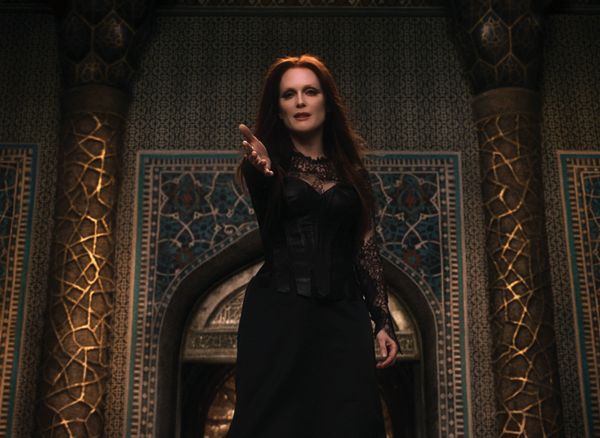
Q: It’s been nearly two decades since you were together in The Big Lebowski. What is it like to be together again and how would you compare and contrast your relationships in the two movies?
MOORE: It’s been 17 years and I have a little Lebowski to prove it, right?
BRIDGES: That’s right, and that wasn’t method acting, right?
MOORE: [Laughs] I was pregnant. I actually got pregnant – it’s not Jeff’s – on The Big Lebowski. My son is 17-years-old, so that’s how we know that it’s been 17 years. Isn’t that crazy?
BRIDGES: Not many people know this, but I think we’ll just let this out of the bag; this film is actually a prequel to The Big Lebowski. [Laughs] There are some kind of weird parallels. I think of Maude flying with the paint is kind of like her dragon. The Dude liked to smoke it and drink it, and, you know, Gregory, I’m sure he’s got some kind of smoking mixture that he would probably enlighten you on. There are probably some similarities. I haven’t really thought too much about it, but now I will.
MOORE: It’s just so great to be with Jeff again. I was saying, I think that not only do we kind of drag our relationship along as people and as actors, but I think the audience does too, so there’s that sense of, ‘Oh, I know those guys! They were in a movie together before.’ [Laughs] That kind of comes along with you and it was something that I hadn’t really anticipated and it’s cool. It’s a really cool thing.
BRIDGES: Good, positive baggage kind of. Even doing what we’re doing here now, it’s kind of the same thing.
MOORE: I know, right?
BRIDGES: Just being together and we had the pleasure of doing a lot of interviews this morning just together and it’s kind of like performing together in a way, you’re riffing off each other and being inspired by each other.
Q: Jeff you won the Oscar. Julianne you are at least a Golden Globe and SAG winner (and currently an Oscar nominee). Julianne, how do you prepare for the red carpet for the event? And Jeff, what advice do you have for her?
MOORE: Well, first I take a bath. [Laughs] And then I tie my tail up. I don’t know. I try to take everything one day at a time. It’s been such a wonderful surprise and so exciting for us. This was a movie that we didn’t finish even a year ago. We started it March of 2014 so by the time the Oscars are over, it won’t even have been a year since we shot it. That’s what’s so astonishing about this, is that we made it, we got it out, we got it distributed and then it’s gotten this kind of attention. It’s absolutely incredible. That never happens. Half the time you make little movies and no one ever sees them. I feel very, very grateful and I am just trying to take it one day at a time, and stay as clean as possible. [Laughs]
BRIDGES: And keep that tail under control. I don’t really know any advice. We talked about it, we acknowledged that feeling of all those emotions, you know? Having that appreciation come at you like that. It’s pretty wonderful. And all the anxiety and the silly obsessions that you have about beating yourself up for not remembering that guy’s name. It’s hard to really describe, but it’s just a flood of all different kinds of emotions. But, you know, we just talked about it, not too much advice really. ‘Hang on, babe! Go for the ride! Surf that big wave!’
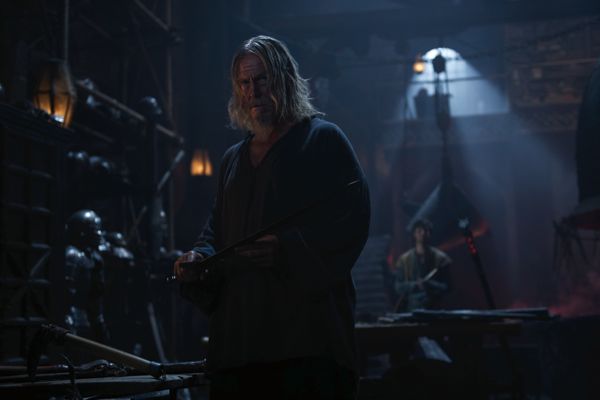
Q: Can you each talk about the physical challenges of these roles and the part that the costumes played in making you feel part of this world?
MOORE: Oh golly, our costumes were tremendous. Not only did I have the tail, but I also had bones that came out of the back, this spine thing and feathers. I had extra hair, contact lenses, special makeup, big shoes. It was the most daunting part, I think for me, were the costumes and trying to kind of carry it off. Jackie West costumes are what made the character for me. It was such a thrill to get to do that. We were talking about it earlier, to have that kind of support, those costumes and Dante Ferretti’s beautiful sets, and that whole fantastical world that they created gave us so much. It allows you to just step into that very easily actually.
BRIDGES: That’s one of the wonderful things about what we’re up to making movies, is that it’s a collaboration of all these artists and you get people like Jackie West who is just focused on how your guy looks and why he looks that way and all his history of all that. Fortunately, one of the early things they do when you’re making a movie is you meet with the costume designer because it takes a while to get all her stuff together, especially on a movie like this. And so all of that information comes to you and, for me, that’s really instrumental in trying to figure out who my guy is and what that looks like. And as you start to put this stuff on, you look in the mirror and go, ‘Oh yeah, yeah, yeah!’ It all starts to kind of fall in place. And then the sets Dante Ferretti got. I was imagining great things and every time I’d see one of them, all my expectations were transcended. It was just wonderful.
BARNES: And they’re so thoughtful too, with the costumes. I remember having my first fitting to try on these toeless sandals and weird three-quarter length pants and this jumper with holes in it. We ended up going very sort of simple at the beginning and then subconsciously, it even does some of the performance for you because as we move through the film, gradually Tom’s clothes becomes more like Master Gregory’s in terms of adding a hood and, by the end, I sort of have a cloak and a hood and it’s more black rather than white. They’re always playing with subconscious tones of good and evil and who you’re becoming more like or less like, and it can do some of the work for you in terms of tones and colors and what you’re blending with in the rest of the film and make you feel confident playing those moments, I think.
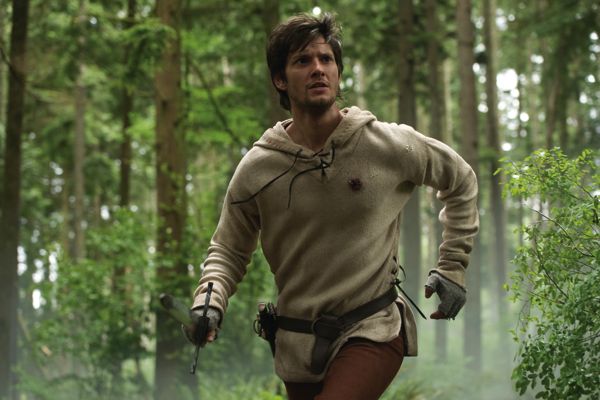
Q: Ben, how did you prepare for the premonitions, especially because you couldn’t see anything while shooting? And Jeff, was the slurred voice something you created or was it in the script?
BARNES: In terms of the visions, you’re right. I didn’t know exactly what they would edit in, in terms of what I would be looking at. At the beginning, I knew it would be something to do with Malkin and her, it’s a dragon now but at the beginning there was an idea it would be more of a bird, like a hawk or something, which is some of the changes visually that you go through as they cut the movie together and find out what they want. The honest answer is, I watched quite a lot of videos of epileptic fits and my very first day on set was actually sort of fitting in the mud of the pig farm. In the final cut, it’s actually much less sort of, maybe graphic’s not quite the right word, but they didn’t want it to seem quite as medical as it did. I think I really went for it with the frothing and the spasming. [Laughs] I was literally on the ground convulsing because I wanted it to seem scary, like an affliction and I think in the end it was, as Master Gregory and Tom talk about, is that it’s a weakness that can eventually be turned into something useful and it’s not useful if you’re spasming on the ground. It was sort of inspired by a sort of epileptic thing because that’s kind of how I saw it, but in the end it turned into more of a nod towards that. But it’s amazing that they can sort of put thoughts in your head afterwards, and it’s amazing sometimes if you do – a lot of the actors I’ve worked who I’ve admired, often when you start, they tell you to do less. ‘Just think it, don’t show it.’ And it’s interesting what they can do afterwards in terms of putting imagery on the screen, and you look at any face and you think it’s thinking about that. It’s extraordinary what they can do after in post.
BRIDGES: Part of the way I work, what are they psychics? Those guys, I remember one called Ramtha. Do you remember Ramtha? There’s one, JC, I think her name was, and then she was [growls] and she comes into the thing. Well, certain characters, or maybe it’s all characters, I kind of invite them in like that way. You never know how it’s gonna pop out. I’ll run that by the director. I like to empower the director to have power over me so I can transcend who I think the guy is and my good ideas, because he’s the one who’s gonna put it all together, you know? As actors, it’s like a collage. You make your painting and then they cut it up and paste it together however they want to do it, so I wanted to see what fit his pictures and then also, we mentioned Jackie West and Dante Ferretti, someone who I’ve worked with many films now is my makeup guy, Thomas Nellen. I had this idea, it’s kind of a silly idea, to wear these weird teeth. You’re in the Dark Ages, you’re not gonna have good teeth. [Laughs] So I wore these teeth, which you couldn’t see at all because of all of that hair! But that made me probably slur a little bit.
BARNES: About twice a day you went, ‘No, wait! My teeth!’
BRIDGES: [Laughs] ‘My teeth!’ Exactly.
BARNES: ‘I don’t have my teeth!’
BRIDGES: Yeah. I don’t know, that’s a silly – that’s a truthful answer, I guess.
Q: When you invite a character in, you have to suspend a lot of your connection with your own presence in the now and also with the reality around you. What would be the most difficult thing for you to give up in order to get into character? The second question has to do with the ending of the film. What’s the reason for the bells ringing?
BRIDGES: They’re all good questions. What was the first one again? [Laughs] I kind of disagree with what you said because it’s that fate thing. I find all the time in movies, in the script it says, ‘It’s a sunny day and the characters are having a sunbath,’ and then the day we’re shooting, it’s raining. Well, that’s God’s, or whatever you say, the universe’s direction. Those are things that you don’t fight, but like Master Gregory says to Ben’s character, ‘What seems like a weakness or bad thing can be a good thing.’ So everything that’s happening in real life is informing what’s going on and you can use all that. As far as the bells ringing at the end, one of the things that I was really hoping that the film could convey is rather than the traditional battle between good and evil, that it could go a little deeper than that. In my research, I came across this quote I’ll read to you by Aleksandr Solzhenitsyn, and I knew we had a Russian director and when I read this, he goes, ‘Oh yeah. Of course.’ He say, ‘That’s exactly right. Let’s do that.’ Here’s the quote, it says, ‘If only there were evil people somewhere insidiously committing evil deeds, and it were necessary only to separate them from the rest of us and destroy them. But the line dividing good and evil cuts through the heart of every human being and who is willing to destroy a piece of his own heart?’ And I’m hoping that is in the movie somewhere. And also, the bells, I’m thinking of that great Bob Dylan song, ‘Ring them bells, ye heathen from the city that dreams …’ And as it ends, I say to Ben’s character, ‘Remember all those things that I taught you? Don’t follow any of those things. Follow your own heart.’ This is a journey that human beings are on and they’re still ringing, there’s still a problem, you still haven’t solved this problem of evil and how we deal with that, not only our projections of evil out there but the evil in our own heart and trying to figure that one out. And after all, she has every right to be pissed off. Her boyfriend, who she loves, locked her in a hole for a hundred years. She’s pissed.
MOORE: The thing you said about suspending your disbelief, my favorite thing about acting is the duality that happens to us when we are working. They say that the time you are suspending your disbelief and allowing yourself to experience this character and the action around you, you also have a second awareness happening all the time of, like I said, the actor saying where the camera is, where all the other technicians are in the room, of what the temperature of the room is, whether or not it’s gonna rain, so it requires kind of a hyper awareness that I really love. It’s my favorite thing. I love being on a film set. What you guys see is just the scene that’s happening right here, but what we see are the mechanisms of our universe going back and back and back. You see everybody, you see the boom operator, you see the camera operator and you see your makeup artist going, ‘Oh, I’ve got to get in there.’ You see all this stuff happening so you’re all working together all the time. It’s that duality of awareness, that’s really one of the most exciting things about performing, for me.
